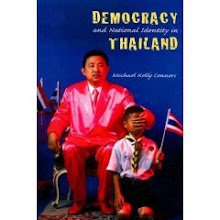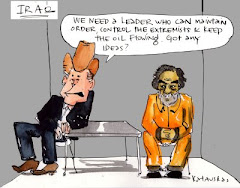November 21, 2007
Thailand: Article of Faith
Article of Faith: The Failure of Royal
Liberalism in Thailand
MICHAEL K. CONNORS
Introduction from article that appears in Journal of Contemporary Asia, 38, 1, 2008.
It seems inevitable that the 2005-06 protests against the elected right-wing populist,Thaksin Shinawatra, will be remembered for the sea of pro-monarchist yellow
t-shirts worn by some protestors and the slavish rhetoric of the slogan to ‘‘return
the royal powers.’’ Any plausible account of those protests must proceed from the
premise that behind the deployment of royalism lay a rational strategy. This article
unpacks the politics of a number of actors who mobilised against Thaksin and
argues that their appeal for monarchical intervention was intended for liberal
purposes. I do this for the purpose of analytically separating the anti-Thaksin
movement (up until the end of April 2006) from the royalist coup d’e´tat that finally
felled the Thaksin government in September 2006.1 The mass mobilisations of 2005
and 2006 were a genuine historical movement and should not be conflated with the
illiberal military and palace networks that eventually ended Thaksin’s rule.
The support by various ‘‘progressive’’ actors for the 2006 coup has given rise to
much soul-searching and polemic. Giles Ji Ungpakorn’s (2007: 30) memorable
phrase ‘‘tank-liberals’’ calls to account those progressive actors who legitimated the coup by participating in the post-coup political institutions. However, Thaksin’s rise to power through the ballot box should not be allowed to disguise his fundamentally anti-democratic politics. The elected Thaksin regime (2001-06) was authoritarian in inclination even if the formal institutions of democracy were in place.
Despite Thaksin’s arguably pro-poor policies, the depth and quality of Thailand’s democracy was greatly diminished under his rule (for a more qualified interpretation see Case,(2007). A basic premise underlying the analysis that follows is that left-wing critiques of authoritarian democracies should proceed from the position that majorities which serve authoritarian ends are hegemonically and coercively structured and do not reflect the free conditions upon which a genuine democracy may be embedded. Of course, the same can be said – substituting ‘‘majorities’’ with ‘‘vanguard elites’’ –of the illegitimate assumption of power by the 2006 coup group.
With this premise in mind, this article analyses the mobilisation of royal ideology
and the call to ‘‘return the royal powers’’ (thawaikheun phrarachaamnat) that
emerged in 2005-06. In the first part of this article, I briefly look at what may be
termed ‘‘royal liberalism’’ – a liberalism shaped by fear of an uneducated citizenry
unschooled in appropriately restrained democratic practice and manipulated by
demagogues, otherwise known as the ‘‘tyranny of the majority.’’ The political rise of
Prime Minister Thaksin Shinawatra gave life to these fears. In the second substantive
part of the article I address how the intervention of a one-time Thaksin supporter,
opportunist media tycoon Sondhi Limthongkul (The Nation, 29 November 2005),
bolstered the fading fortunes of Thai liberalism, giving rise to calls, on the basis of Article 7 of the 1997 Constitution (see below), for power to be returned to the king.
To examine the elite liberalism behind this strategy, I look at the origins of Article 7. Relatedly, it is necessary to look at the revival of the neologism rachaprachasamasai (royal-people-mutuality), which was used to demonstrate how calls for royal intervention were in accord with ‘‘the traditions of Thai democracy.’’2 It will be argued that this mobilisation reflected a long-term project to establish a liberal state based on the ideological power of the monarchy. I then discuss how key actors differentially invoked Article 7. Finally, I consider the implications of royal liberalism’s failure to solve the crisis.
Before I begin, a qualification: it may be argued that monarchy and liberalism are
dichotomous, given that conservative monarchists understand rights in terms of
cultural heritage rather than something given to the universal nature of the
individual as in classical forms of liberalism. All ideologies, more so than doctrines, contain contradictory strains. My interest here is in the adaptation of monarchy and ideals around it to the emergence of a Thai liberal political settlement out of messy institutional, political and ideological struggles: that is, political liberalism not philosophical liberalism.
Liberalism in Thailand
MICHAEL K. CONNORS
Introduction from article that appears in Journal of Contemporary Asia, 38, 1, 2008.
It seems inevitable that the 2005-06 protests against the elected right-wing populist,Thaksin Shinawatra, will be remembered for the sea of pro-monarchist yellow
t-shirts worn by some protestors and the slavish rhetoric of the slogan to ‘‘return
the royal powers.’’ Any plausible account of those protests must proceed from the
premise that behind the deployment of royalism lay a rational strategy. This article
unpacks the politics of a number of actors who mobilised against Thaksin and
argues that their appeal for monarchical intervention was intended for liberal
purposes. I do this for the purpose of analytically separating the anti-Thaksin
movement (up until the end of April 2006) from the royalist coup d’e´tat that finally
felled the Thaksin government in September 2006.1 The mass mobilisations of 2005
and 2006 were a genuine historical movement and should not be conflated with the
illiberal military and palace networks that eventually ended Thaksin’s rule.
The support by various ‘‘progressive’’ actors for the 2006 coup has given rise to
much soul-searching and polemic. Giles Ji Ungpakorn’s (2007: 30) memorable
phrase ‘‘tank-liberals’’ calls to account those progressive actors who legitimated the coup by participating in the post-coup political institutions. However, Thaksin’s rise to power through the ballot box should not be allowed to disguise his fundamentally anti-democratic politics. The elected Thaksin regime (2001-06) was authoritarian in inclination even if the formal institutions of democracy were in place.
Despite Thaksin’s arguably pro-poor policies, the depth and quality of Thailand’s democracy was greatly diminished under his rule (for a more qualified interpretation see Case,(2007). A basic premise underlying the analysis that follows is that left-wing critiques of authoritarian democracies should proceed from the position that majorities which serve authoritarian ends are hegemonically and coercively structured and do not reflect the free conditions upon which a genuine democracy may be embedded. Of course, the same can be said – substituting ‘‘majorities’’ with ‘‘vanguard elites’’ –of the illegitimate assumption of power by the 2006 coup group.
With this premise in mind, this article analyses the mobilisation of royal ideology
and the call to ‘‘return the royal powers’’ (thawaikheun phrarachaamnat) that
emerged in 2005-06. In the first part of this article, I briefly look at what may be
termed ‘‘royal liberalism’’ – a liberalism shaped by fear of an uneducated citizenry
unschooled in appropriately restrained democratic practice and manipulated by
demagogues, otherwise known as the ‘‘tyranny of the majority.’’ The political rise of
Prime Minister Thaksin Shinawatra gave life to these fears. In the second substantive
part of the article I address how the intervention of a one-time Thaksin supporter,
opportunist media tycoon Sondhi Limthongkul (The Nation, 29 November 2005),
bolstered the fading fortunes of Thai liberalism, giving rise to calls, on the basis of Article 7 of the 1997 Constitution (see below), for power to be returned to the king.
To examine the elite liberalism behind this strategy, I look at the origins of Article 7. Relatedly, it is necessary to look at the revival of the neologism rachaprachasamasai (royal-people-mutuality), which was used to demonstrate how calls for royal intervention were in accord with ‘‘the traditions of Thai democracy.’’2 It will be argued that this mobilisation reflected a long-term project to establish a liberal state based on the ideological power of the monarchy. I then discuss how key actors differentially invoked Article 7. Finally, I consider the implications of royal liberalism’s failure to solve the crisis.
Before I begin, a qualification: it may be argued that monarchy and liberalism are
dichotomous, given that conservative monarchists understand rights in terms of
cultural heritage rather than something given to the universal nature of the
individual as in classical forms of liberalism. All ideologies, more so than doctrines, contain contradictory strains. My interest here is in the adaptation of monarchy and ideals around it to the emergence of a Thai liberal political settlement out of messy institutional, political and ideological struggles: that is, political liberalism not philosophical liberalism.
Subscribe to:
Posts (Atom)





